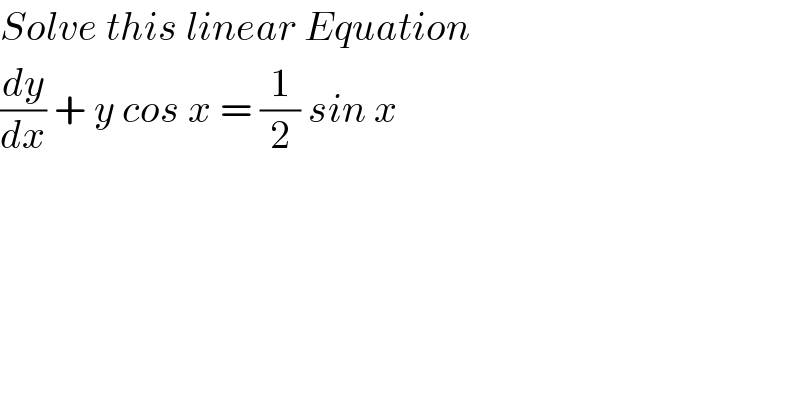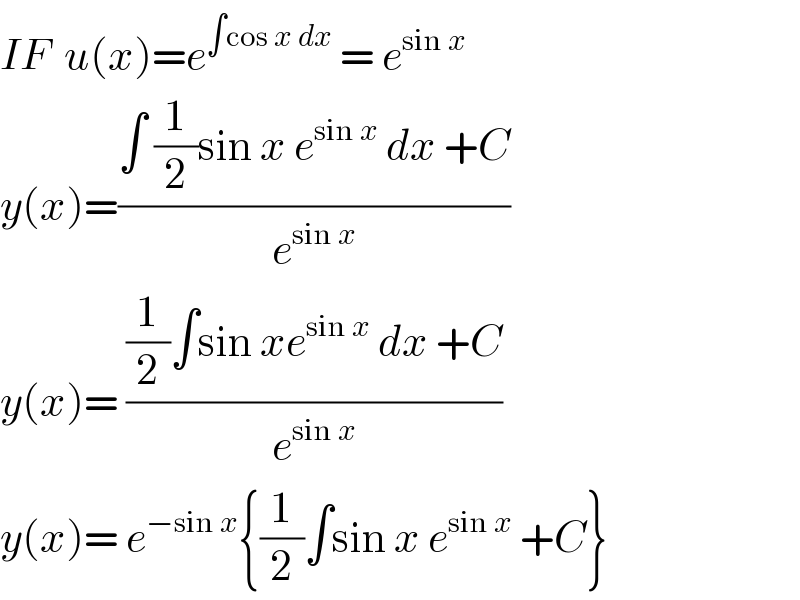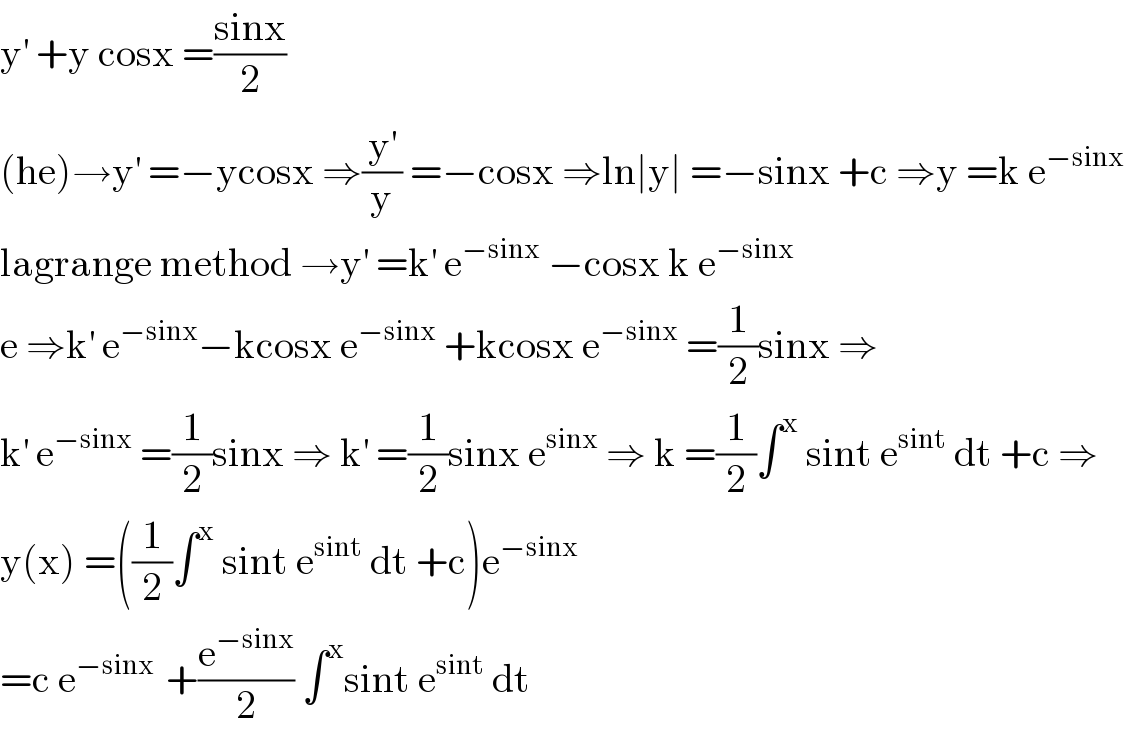Question Number 102323 by Learner101 last updated on 08/Jul/20

$${Solve}\:{this}\:{linear}\:{Equation} \\ $$$$\frac{{dy}}{{dx}}\:+\:{y}\:{cos}\:{x}\:=\:\frac{\mathrm{1}}{\mathrm{2}}\:{sin}\:{x} \\ $$
Answered by bemath last updated on 08/Jul/20

$${IF}\:\:{u}\left({x}\right)={e}^{\int\mathrm{cos}\:{x}\:{dx}} \:=\:{e}^{\mathrm{sin}\:{x}} \\ $$$${y}\left({x}\right)=\frac{\int\:\frac{\mathrm{1}}{\mathrm{2}}\mathrm{sin}\:{x}\:{e}^{\mathrm{sin}\:{x}} \:{dx}\:+{C}}{{e}^{\mathrm{sin}\:{x}} } \\ $$$${y}\left({x}\right)=\:\frac{\frac{\mathrm{1}}{\mathrm{2}}\int\mathrm{sin}\:{xe}^{\mathrm{sin}\:{x}} \:{dx}\:+{C}}{{e}^{\mathrm{sin}\:{x}} } \\ $$$${y}\left({x}\right)=\:{e}^{−\mathrm{sin}\:{x}} \left\{\frac{\mathrm{1}}{\mathrm{2}}\int\mathrm{sin}\:{x}\:{e}^{\mathrm{sin}\:{x}} \:+{C}\right\} \\ $$
Commented by bemath last updated on 08/Jul/20

$${yes}\:{sir}.\: \\ $$
Answered by mathmax by abdo last updated on 08/Jul/20

$$\mathrm{y}^{'} \:+\mathrm{y}\:\mathrm{cosx}\:=\frac{\mathrm{sinx}}{\mathrm{2}} \\ $$$$\left(\mathrm{he}\right)\rightarrow\mathrm{y}^{'} \:=−\mathrm{ycosx}\:\Rightarrow\frac{\mathrm{y}^{'} }{\mathrm{y}}\:=−\mathrm{cosx}\:\Rightarrow\mathrm{ln}\mid\mathrm{y}\mid\:=−\mathrm{sinx}\:+\mathrm{c}\:\Rightarrow\mathrm{y}\:=\mathrm{k}\:\mathrm{e}^{−\mathrm{sinx}} \\ $$$$\mathrm{lagrange}\:\mathrm{method}\:\rightarrow\mathrm{y}^{'} \:=\mathrm{k}^{'} \:\mathrm{e}^{−\mathrm{sinx}} \:−\mathrm{cosx}\:\mathrm{k}\:\mathrm{e}^{−\mathrm{sinx}} \\ $$$$\mathrm{e}\:\Rightarrow\mathrm{k}^{'} \:\mathrm{e}^{−\mathrm{sinx}} −\mathrm{kcosx}\:\mathrm{e}^{−\mathrm{sinx}} \:+\mathrm{kcosx}\:\mathrm{e}^{−\mathrm{sinx}} \:=\frac{\mathrm{1}}{\mathrm{2}}\mathrm{sinx}\:\Rightarrow \\ $$$$\mathrm{k}^{'} \:\mathrm{e}^{−\mathrm{sinx}} \:=\frac{\mathrm{1}}{\mathrm{2}}\mathrm{sinx}\:\Rightarrow\:\mathrm{k}^{'} \:=\frac{\mathrm{1}}{\mathrm{2}}\mathrm{sinx}\:\mathrm{e}^{\mathrm{sinx}} \:\Rightarrow\:\mathrm{k}\:=\frac{\mathrm{1}}{\mathrm{2}}\int^{\mathrm{x}} \:\mathrm{sint}\:\mathrm{e}^{\mathrm{sint}} \:\mathrm{dt}\:+\mathrm{c}\:\Rightarrow \\ $$$$\mathrm{y}\left(\mathrm{x}\right)\:=\left(\frac{\mathrm{1}}{\mathrm{2}}\int^{\mathrm{x}} \:\mathrm{sint}\:\mathrm{e}^{\mathrm{sint}} \:\mathrm{dt}\:+\mathrm{c}\right)\mathrm{e}^{−\mathrm{sinx}} \\ $$$$=\mathrm{c}\:\mathrm{e}^{−\mathrm{sinx}\:} \:+\frac{\mathrm{e}^{−\mathrm{sinx}} }{\mathrm{2}}\:\int^{\mathrm{x}} \mathrm{sint}\:\mathrm{e}^{\mathrm{sint}} \:\mathrm{dt} \\ $$
